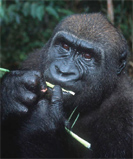Get
To Know
|
 The Western Lowland Gorilla lives in montane, primary and secondary
forests and lowland swamps in central Africa where they eat around
19 kg of roots, shoots, fruit, wild celery, tree bark and pulp which
is provided for in the thick forests. Their black skin along with
coarse black hair that covers their entire body except for the face,
ears, hands, and feet. At the largest, they can stand at 1.5-1.8
m tall and weigh 140-270 kg. They travel within a home range averaging
8-45 sq Km and usually go as far as 5-3 km per day in family groupings
of 4 to 8 members in each. The leader organizes group activities,
like eating, nesting, and traveling in their home range. Females
do not reach sexual maturity until the age of 8 or 9 when they can
give birth to one infant after a pregnancy of nearly nine months.
The infants ride on their mothers' backs from the age of four months
through the first two or three years of their lives and can be dependent
on their mother for up to five years. Their intelligence can be
seen through their ability to fashion tools by selecting branches,
remove projections such as leaves and bark, and adapting their length
to the depth of the holes. Koko, a trapped gorilla mastered more
than 1,000 signs in order to communicate with her human captors.
A number of factors threaten their extinction. They are hunted illegally
for their skins and meat in Africa and captured to be sold to zoos,
and they are affected by deforestation, farming, grazing, and the
expanding human settlements that cause forest loss.
The Western Lowland Gorilla lives in montane, primary and secondary
forests and lowland swamps in central Africa where they eat around
19 kg of roots, shoots, fruit, wild celery, tree bark and pulp which
is provided for in the thick forests. Their black skin along with
coarse black hair that covers their entire body except for the face,
ears, hands, and feet. At the largest, they can stand at 1.5-1.8
m tall and weigh 140-270 kg. They travel within a home range averaging
8-45 sq Km and usually go as far as 5-3 km per day in family groupings
of 4 to 8 members in each. The leader organizes group activities,
like eating, nesting, and traveling in their home range. Females
do not reach sexual maturity until the age of 8 or 9 when they can
give birth to one infant after a pregnancy of nearly nine months.
The infants ride on their mothers' backs from the age of four months
through the first two or three years of their lives and can be dependent
on their mother for up to five years. Their intelligence can be
seen through their ability to fashion tools by selecting branches,
remove projections such as leaves and bark, and adapting their length
to the depth of the holes. Koko, a trapped gorilla mastered more
than 1,000 signs in order to communicate with her human captors.
A number of factors threaten their extinction. They are hunted illegally
for their skins and meat in Africa and captured to be sold to zoos,
and they are affected by deforestation, farming, grazing, and the
expanding human settlements that cause forest loss.
|
|
|
|
No one much noticed
the ogre at first. He kind
of just shuffled in
while others argued slowly.
Everyone knew who he was
from watching their favorite
channels and so forth.
Then it was like, Oh, I guess
the ogre is it.
Oh, he is the one.
Even people who knew better
said the ogre's the right one.
He'll get some talented creatures
to help him even though
the ogre doesn't know what
he's doing.
And that is the fairy story
of how the ogre almost came
to power a long, long time ago.
|
 The
Lowland Gorilla - Issue Twenty-Seven
The
Lowland Gorilla - Issue Twenty-Seven